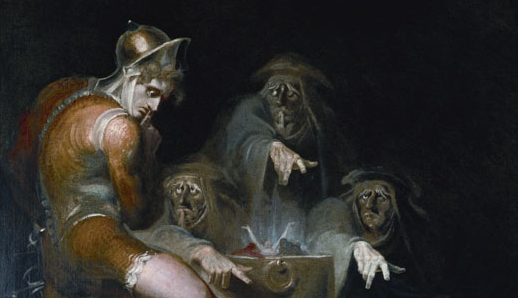
With participants in this year’s March for Life converging upon Washington this week, it seems to me apropos to consider one of the Western Civilization’s profoundest reflections upon the Fifth Commandment. In a pivotal scene of Shakespeare’s Macbeth, the ambitious title character gets cold feet, entertaining last-minute second thoughts regarding his plan to murder Scotland’s rightful king and seize the throne. After all, said king is a guest under Macbeth’s very roof, so the killing would represent a three-way disruption of the natural order of the things.
“He’s here in double trust,” Macbeth reflects,
First, as I am his kinsman and his subject,
Strong both against the deed; then, as his host,
Who should against his murderer shut the door,
Not bear the knife myself.
In other words, the murder is fundamentally impious, because Macbeth would be killing a man who is simultaneously his guest with a legitimate claim on his hospitality, his sovereign with a legitimate claim to his allegiance, and his blood-relative with a legitimate claim to his affection. So the assassination of the rightful monarch is a threefold transgression representing a kind of unconditional trampling upon nature. In addition is the fact that Duncan is not only Macbeth’s lawful lord, but a good one at that, one who has been “clear in his great office.”
What some among us will notice is that not once in this intense Shakespearean meditation upon good and evil does Macbeth or anybody else so much as mention the king’s abstract human rights, which would have been of no interest to moralists or legislators – and certainly not to poets or ordinary people – until relatively recently. Indeed, it may be worth noting that the decidedly individualistic discourse of human rights only came to be regarded as the end-all, be-all of justice right around the time that feminists succeeded in persuading the Supreme Court that a woman has an inalienable right to evict an unwelcome child from her body.
That is, a case can be made that human rights discourse represents a lopsided version of justice, one which even at its best fails to give proper weight to duties, gratitude, and the foundational relationships men live by. In its worst form, of course, human rights theory is a flawed secular humanist construct which is incompatible with traditional morality.
Certainly when we consider Macbeth’s sinister wife, who is even more ambitious than he is, we find unsettling parallels with feminism, one of the greatest and most obviously pernicious of rights-based ideologies. When Lady Macbeth explicitly decides to cast aside her female nature, she prays to unwholesome spirits that they might “unsex” her and “take [her] milk for gall.” Having discarded her God-given femininity, she finds the steely resolve to rebuke her husband for his second thoughts, as his attack of conscience is mistaken by her for irresolute cowardice:
I have given suck
And know how tender ’tis to love the babe that milks me:
I would, while it was smiling in my face,
Have pluck’d my nipple from his boneless gums
And dash’d the brains out, had I so sworn as you
Have done to this.
Which is better suited to express the deep truth regarding abortion: the blunt, jarring language of the preceding monologue, or the legalistic and egalitarian language of rights? When we protest abortion we are not simply objecting to murder, plain and simple, grave though murder is; for that matter, when we protest abortion we are not just objecting to the murder of children, which is admittedly more disturbing still; when we protest abortion, what we object to is the entirely unnatural spectacle of a mother opting to have the brains dashed out of her very own baby’s skull.
In this context, Lady Macbeth’s most famous scene becomes all the more chilling, as we are presented with the aftermath of mortal guilt unalleviated by grace. Haunted by the spectral memories of those she and her husband has slain, Lady Macbeth spends her nights like a phantom herself, sleepwalking through her home, vainly trying to scrub an invisible bloodstain from her hands: “Out, damned spot!” Finally, in despair, she kills herself. Her terrible line calls to mind the powerlessness of establishmentarian solutions in a drug-addled, war-exhausted, post-familial United States, and highlights the futility of trying to wash away troubles without first making a profound effort to reconsider and repent.
If you value the news and views Catholic World Report provides, please consider donating to support our efforts. Your contribution will help us continue to make CWR available to all readers worldwide for free, without a subscription. Thank you for your generosity!
Click here for more information on donating to CWR. Click here to sign up for our newsletter.






That is, a case can be made that human rights discourse represents a lopsided version of justice, one which even at its best fails to give proper weight to duties, gratitude, and the foundational relationships men live by. In its worst form, of course, human rights theory is a flawed secular humanist construct which is incompatible with traditional morality.
It is a shrunken view of human relationships and justice because of the state, and a form of Justice that those who rule must concede because it protects them.
Which is better suited to express the deep truth regarding abortion: the blunt, jarring language of the preceding monologue, or the legalistic and egalitarian language of rights? When we protest abortion we are not simply objecting to murder, plain and simple, grave though murder is; for that matter, when we protest abortion we are not just objecting to the murder of children, which is admittedly more disturbing still; when we protest abortion, what we object to is the entirely unnatural spectacle of a mother opting to have the brains dashed out of her very own baby’s skull.
Jerry, thank you profusely for this article and especially for the quote above. Your philosophy is superior. Hope many most priests and Bishops read this article.